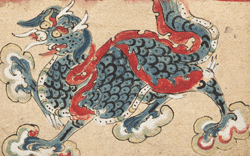This exhibition unites approximately one hundred works of Naxi religious art primarily acquired by Quentin Roosevelt, grandson of President Theodore Roosevelt, and botanist-explorer Joseph Rock in the early- to mid-twentieth century, for the first time.
The Naxi—one of China's fifty-five ethnic minority nationalities—traditionally practiced the Dongba religion. Dongba has distinct artistic expressions, though it reflects influences from Bon, Buddhism, Taoism, Confucianism, Mongolian shamanism, and popular cults. The religion's ritual corpus, comprising some one thousand ceremonies, is contained in manuscripts filled with Dongba script—the only living pictographic language in the world. Examples of these manuscripts, as well as funeral scrolls, altar sticks, thangka paintings, and ritual objects reveal Naxi art as it was found in Lijiang before China's Revolution in 1949.
To learn even more about Quentin Roosevelt's China and the Naxi, read the press release.
Curated by Cindy Ho, Christine Mathieu, and Martin Brauen
This exhibition was funded, in part, by the Peco Stacpoole Foundation.

